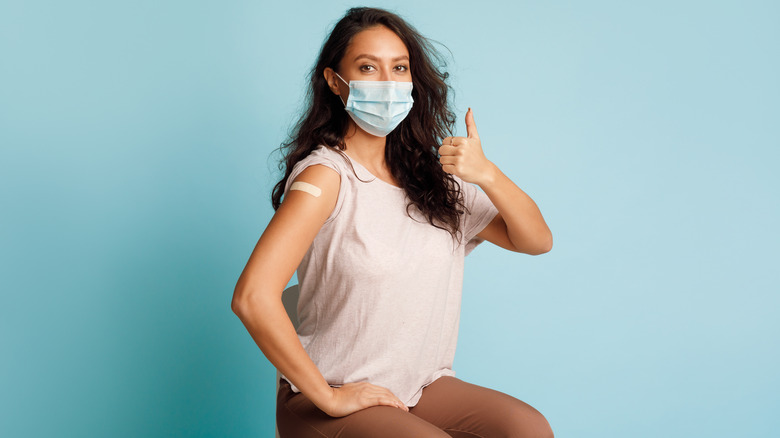Here's What You Should Know About 'Vaccine Cocktails'
When the COVID-19 pandemic began in early 2020, the world didn't know how to combat the disease. Fast-forward to 2021, and now in the U.S., there are three approved vaccines to help protect people from the coronavirus: a two-dose primary series from Moderna or from Pfizer-BioNTech or a one-dose primary series from Johnson & Johnson (via CDC). If you got your first shot in the series with Moderna, you'd have gotten your second shot of Moderna four weeks later. If you got your first shot in the series with Pfizer, you'd have gotten your second shot of Pfizer three weeks later. There was no mix and match option.
The latest iteration in vaccines against COVID-19 is the booster shot. With the latest coronavirus mutation or Omicron variant, which spreads more quickly than the previously dominant Delta variant, having high immunity is ideal. And while you previously had to stay with the same vaccine, with the booster, that is no longer a requirement, according to the CDC.
Choose an mRNA vaccine for your booster
While Pfizer, Moderna, and Johnson & Johnson may all be competing companies, your body doesn't care which company made your booster vaccine. And while the first vaccine you can get is the one you should get, the latest CDC recommendation is that the mRNA vaccines, like those made by Moderna and Pfizer, are the ideal booster — regardless of what you got in your first vaccine series.
Researchers from Northwestern University found that with an mRNA booster shot, antibody levels were higher than after the primary two-shot series. Researchers also found that the number of booster antibodies was 50 times more compared to someone who had contracted COVID-19 naturally.
According to the Mayo Clinic, mRNA vaccines work by telling your cells to create the spike protein that the COVID-19 virus has, which prompts your body to start making antibodies. The Johnson & Johnson vaccine is a vector vaccine, which means spike protein DNA is placed in a different and modified virus (i.e., vector) which instructs your cells to make more spike proteins, which, again, then triggers the immune system to kick in by creating antibodies (via Mayo Clinic). "They both work very similarly, in that they teach your own immune system how to fight against COVID-19, but they do it in a little bit of a different manner," Dr. Kruti Yagnik, an infectious disease specialist, told USA Today.

